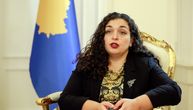Serbia's foreign policy in previous year: From Open Balkan to struggle to preserve its own interests
When it comes to Open Balkan, I think we have gone very far, especially when we take into account the obstruction that comes from unexpected but also expected places - says Dejan Miletic from the Center for the Study of Globalization
The foreign policy position of Serbia in the previous year can be assessed as complex, but despite a number of aggravating circumstances, certain successes have been achieved, especially at the regional level, the pundits speaking for Radio Belgrade 1 have stressed, RTS reports.
They said cooperation in the western Balkans, at least in part, has been strengthened by concrete agreements within the Open Balkan initiative, which includes of Serbia, North Macedonia and Albania.
Dejan Miletic from the Center for the Study of Globalization believes that Belgrade is ready to take the region forward in the field of economy.
"When it comes to Open Balkan, I think we have gone very far, especially when we consider obstructions that come from unexpected, but also expected places," satisfied Miletic.
He added that Podgorica and the central authorities in Sarajevo are refusing to join the initiative for now, although that would bring them undoubted economic benefits in the form of "bridging bureaucratic procedures, which would lead to great savings."
Dejan Miletic says he expected obstructions from the interim authorities in Pristina, while Pristina's unconstructive behavior makes it difficult to continue the dialogue in Brussels. Several rounds have been held at different levels, but there has been almost no progress.
"This also affects the process of negotiations on joining the European Union, where progress has been made after two years, by opening a cluster with four chapters," Slobodan Zecevic from the Institute for European Studies told Radio Belgrade 1.
According to him, Serbia cannot be completely satisfied with the speed of the reforms it is implementing, but he believes that the EU has its own role in slowing down the process, especially considering that there were proposals to open two groups of chapters at the intergovernmental conference.
"The question remains why that was so. If there were no technical problems related to our preparations for the opening, it is possible that this is a political move to encourage Serbia through the opening of one cluster, but still wait for the definitive change in the field of justice, i.e. the change of the Constitution. It's possible that the situation in Kosovo and Metohija will be monitored, as well as the April elections," says Zecevic.
In relations with world powers, Serbia is always taking the stance of a reliable partner, although with the change of administration in Washington there has been increased pressure from the United States, Dejan Miletic points out.
According to him, the situation is much better when it comes to Serbia's ties with Moscow and Beijing.
"We have traditionally good relations with China, they are developing, although in the past year there may not have been so much talk in the media, except when it comes to combating Covid, although a strong Chinese presence in Serbia is visible through investment projects. We can say that relations with Russia have been improved in two aspects - energy, and the military," Miletic points out.
He concluded that despite everything, Serbia managed to maintain the foreign policy positions that suit it.
(Telegraf.rs)

